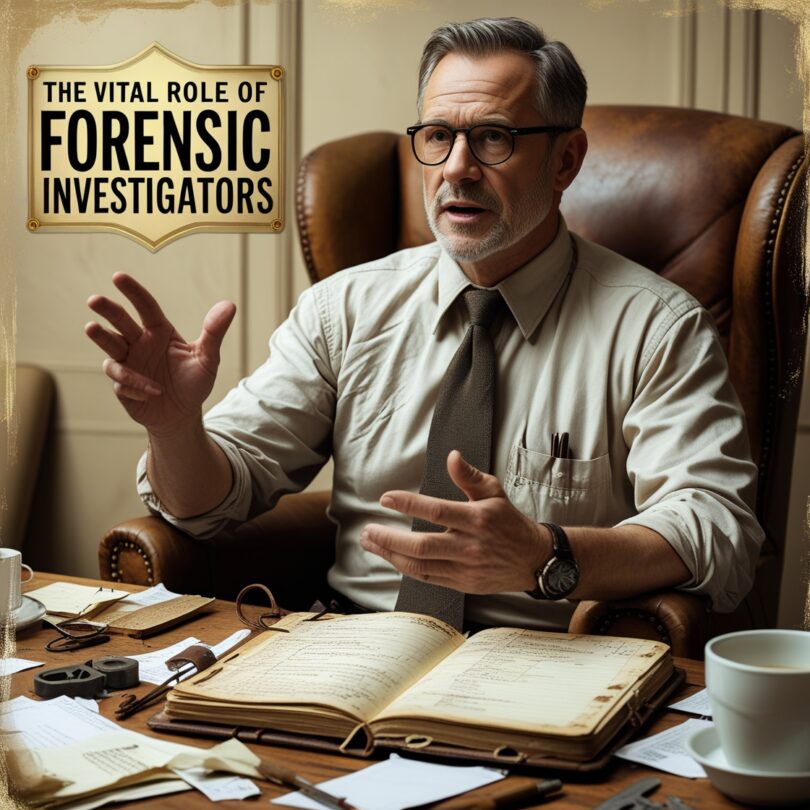The Role of a Forensic Investigator
How Forensic Investigators Bring Clarity to Complex Mysteries
A forensic investigator plays a crucial role in solving mysteries and ensuring justice is served. These professionals dive into the details to uncover facts, bringing clarity to complex situations. In this blog post, we explore the responsibilities, skills, and techniques employed by forensic investigators.
Responsibilities of a Forensic Investigator
- Evidence Collection: Forensic investigators are responsible for gathering physical evidence from crime scenes, which could include fingerprints, fibers, or digital data.
- Analysis and Examination: Once evidence is collected, it must be analyzed using various scientific techniques. This can reveal critical insights that help piece together events.
- Report Writing: Clear and comprehensive reports are essential. These documents record findings methodically, ensuring that details are understandable to others.
- Court Testimony: In some cases, forensic investigators may need to present their findings in court, explaining their evidence and conclusions to judges, lawyers, and juries.
- Collaboration with Law Enforcement: Forensic investigators work closely with police officers, detectives, and other law enforcement personnel. Their collaboration ensures that all aspects of an investigation are covered comprehensively.
- Preserving the Crime Scene: Ensuring that the crime scene remains uncontaminated is crucial. Forensic investigators must carefully document and preserve the scene to maintain the integrity of the evidence.
Key Skills for Forensic Investigators
- Critical Thinking: Forensic investigators need to evaluate evidence logically and objectively, making connections that aren’t immediately apparent.
- Attention to Detail: Missing even a small piece of evidence could be crucial. Detail-oriented individuals ensure nothing is overlooked.
- Scientific Knowledge: A strong understanding of scientific principles and techniques is vital for analyzing evidence accurately.
- Communication Skills: Whether writing reports or testifying in court, clear communication helps convey findings effectively.
- Tech Savviness: As digital evidence becomes more prevalent, familiarity with technology and cybersecurity is increasingly important.
- Problem-Solving Abilities: Forensic investigators often face complex challenges. Quick thinking and innovative solutions help in overcoming obstacles during an investigation.
- Objectivity: It’s essential to remain unbiased. Decisions and analyses should be based solely on evidence and facts, without the influence of personal opinions.
Techniques and Tools
- Fingerprint Analysis: One of the oldest forensic tools, fingerprint analysis, helps match prints found at a crime scene to potential individuals.
- DNA Profiling: DNA evidence can conclusively link a suspect to a crime scene with high precision.
- Digital Forensics: Data from computers, smartphones, and other digital devices can provide leads or support findings.
- Forensic Photography: Detailed images from a crime scene are essential for documenting evidence and the environment.
- Ballistics Analysis: This involves studying firearms, ammunition, and bullet impacts to understand the mechanics of a shooting incident.
- Toxicology: Examining bodily fluids for toxins or chemicals can provide insights into causes of death or incapacitation.
- Trace Evidence Analysis: Small pieces of evidence, like hair or paint chips, can be analyzed to provide key information about a crime.
- Facial Reconstruction: When necessary, forensic artists use skeletal remains to reconstruct a person’s appearance, aiding in identification.
Tips for Aspiring Forensic Investigators
- Pursue Relevant Education: Degrees in forensic science, criminal justice, or related fields provide a solid foundation.
- Gain Experience: Internships or volunteer opportunities can offer practical experience and insight into daily tasks.
- Stay Updated: Forensic science is continually evolving. Keeping up with the latest advancements is crucial.
- Ethical Practice: Always adhere to ethical guidelines, ensuring all investigations are conducted respectfully and truthfully.
- Networking: Building connections within the forensic community can lead to collaborative opportunities and knowledge sharing.
- Continuous Learning: Attend workshops, conferences, or courses to stay at the forefront of forensic advancements.
- Certification: Obtaining certification from recognized forensic organizations can enhance credibility and career prospects.
- Develop Soft Skills: Skills such as empathy, patience, and adaptability can greatly enhance interactions with team members and those impacted by investigations.
Challenges in Forensic Investigation
- Rapid Technological Changes: Keeping up with fast-paced technological advancements can be demanding but essential for digital forensics.
- High-Stakes Pressure: The need for accuracy in findings can be immense, as results often have significant legal implications.
- Exposure to Disturbing Scenes: It is crucial for forensic investigators to manage their mental health, given the difficult nature of the cases they encounter.
In conclusion, the role of a forensic investigator is vital in the realm of law and justice, requiring a blend of scientific expertise and meticulous attention to detail. These professionals are pivotal in uncovering truths and ensuring that justice is upheld through careful examination and thoughtful analysis.






